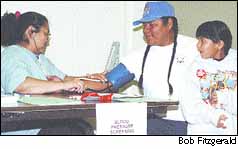Mar. 7, 2000
by jim mimiaga The Ute Mountain Ute tribe sponsored its second-annual Diabetes Awareness Day and Pow Wow in Towaoc on Saturday, with good results. Forty tribal members participated in screenings to test for diabetes, a blood disease that prevents the pancreas from creating insulin, a hormone that the body needs to control blood-sugar levels properly. If not caught and treated early, diabetes can lead to a multitude of health problems, including kidney failure, heart attacks, blindness and limb amputation. It can be treated effectively with daily insulin shots, a diet of low-fat foods and exercise. But awareness and acceptance of the disease is the first step. The event was started last year to better inform the community about diabetes, and to offer blood screenings, support groups, and education for Ute Mountain tribal members, 297 of whom have some form of the disease. "We want to let people know that we do have diabetes in this community," said Rita King, the Ute Mountain Tribe’s Diabetes program coordinator. "Some people would rather keep it in the closet, but we want it out so that they can do something about the problem and not be embarrassed about it." That ‘something’ is usually a change in diet and exercise, coupled with daily insulin shots to control blood sugar. If left untreated, diabetes can cause permanent liver damage or kidney failure. Without properly functioning kidneys, diabetics are forced to attend daily dialysis treatment, a laborious process during which a patient’s blood is drawn out of the body, filtered through a series of filters, and then pumped back into the body. The treatment takes hours and must be done on a regular basis. "Dialysis can be prevented through early detection," King said. "We want to teach our community that people with diabetes can live normal lives, but they need to find out now if they have it, so proper treatment can begin." King said that since the awareness campaign, the number of tribal members diagnosed with diabetes has risen, with an average of three new cases per month. Symptoms of the disease are obesity, fatigue, frequent urinating, sudden weight loss, blurred vision and many infections. However, a lack of these symptoms does not necessarily mean that the body is regulating glucose properly in the blood. "A person who has diabetes may not feel sick at all," Cenovia Wing said during the Pow Wow ceremony. "The only way to know for sure is to have a blood sugar test." Wing added that the disease effects people of all ages, and that those with a family history of diabetes are especially vulnerable. Lack of exercise and obesity put a person at risk for diabetes, she explained. Over-eating raises the body’s blood sugar, and without exercise to absorb it into the muscles, or proper amounts of insulin, that glucose level stays too high. The condition leads to overtaxed kidneys and liver, which have to work overtime to filter out excess sugars. This then causes blood pressure to rises, increasing the chance for a heart attack. "As the years have gone on, our people are not getting the exercise their bodies were accustomed to a long time ago and this is the result," King said. "What we are promoting is more walking and other daily exercise. For children, it is really important to encourage those healthy habits early on so they can teach the next generation. Awareness is the key." Tribal leaders want to remind tribal members to "stand up and be counted" for this year’s census. Funding for fighting life threatening diseases, including diabetes, depend on those numbers. For a free blood screening, tribal members can stop by the Towaoc Indian Health Service building, or the Community Health Building. The procedure takes just a few minutes. Call Rita King at 564 5382 for more information. |
||||
Copyright © 2000 the Cortez Journal. All rights
reserved. |
